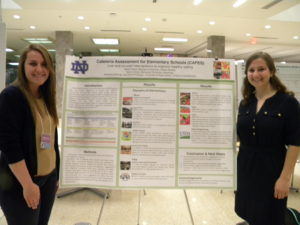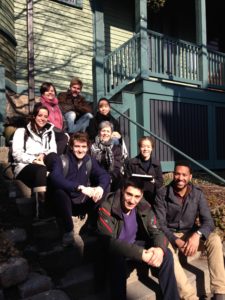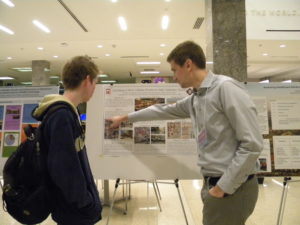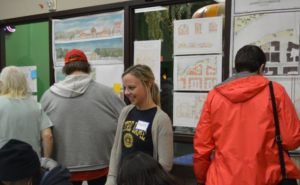Healthy Places ND is a research group of primarily ND undergraduate students from several fields, including architecture, sociology, biological sciences, neuroscience and behavior, civil engineering, theology, and American studies. The group is currently working on several internally and externally funded projects:
School cafeteria design: Cafeteria Assessment for Elementary Schools
Kim Rollings (University of Notre Dame) & Nancy Wells (Cornell University)
The Cafeteria Assessment for Elementary Schools (CAFES) is a valid, reliable, and objective tool that quantifies physical attributes of cafeteria environments linked to selection and consumption of fruits and vegetables (FV). Cafeteria design – from individual foods and plates to serving displays, furniture, and interior design – can affect what students’ select and consume during school meals, in addition to policies affecting food access and school siting which are difficult to change. CAFES generates scores linked to low- and no-cost intervention suggestions schools can immediately implement and improve students’ diets. The CAFES project is contributing to the development of evidence-based cafeteria design guidelines and was presented at EDRA 2013 in Providence, RI and ISBNPA 2014 in San Diego, CA. Researchers at the University of Nebraska Medical Center, Teacher’s College Columbia University, and University of Maryland School of Medicine are currently exploring applications of CAFES in their studies.
Funding: USDA-FNS People’s Garden pilot program (Project CN-CGP-11-0047); Robert Wood Johnson Foundation, Active Living Research Program (ID #69550); Cornell Center for Behavioral Economics in Child Nutrition; Design & Environmental Analysis, Cornell University; United Way of St. Joseph County; University of Notre Dame Office of Research Initiation Grant; University of Notre Dame School of Architecture

Neighborhood design & children’s mental health
Kim Rollings (University of Notre Dame), Gary Evans (Cornell University), Nancy Wells (Cornell University), Yizhao Yang (U. Oregon), Amanda Bednarz (U. Oregon)
Research findings generally suggest an association between living in deprived neighborhoods and poor health outcomes, but often define neighborhoods by socioeconomic status. Specific physical neighborhood attributes related to these health outcomes are not typically identified. In addition to individual factors and housing, neighborhoods have emerged as relevant contexts when examining environmental influences on health. This project is developing a tool to assess physical neighborhood quality in ways conceptually relevant to children’s mental health and stress. Physical neighborhood environment variables include: noise, air pollution, neighborhood stability (e.g., vacant units, turnover), neighborhood buildings (damaged houses, year built), sidewalk condition, land use mix, density, street connectivity, proximity to resources, and nearby nature. An initial index has been developed by the authors using longitudinal data collected from rural children; now, the Healthy Places ND group is collecting data from urban children with the aim of informing design practitioners and policy makers. This type of evidence about the connection between the built environment and health can add authority to design proposals.
Funding: Cornell University, John D. and Catherine T. MacArthur Foundation; University of Notre Dame Office of Research Initiation Grant; University of Notre Dame School of Architecture

Permanent Supportive Housing
Kim Rollings (University of Notre Dame)
Permanent supportive housing (PSH or “supportive housing”) serves people who require long-term housing assistance with supportive services in order to remain housed. PSH links decent, safe, affordable, community-based housing with voluntary support services that address various challenges associated with chronic homelessness such as addiction and other physical and mental impairments, including serious mental illness. Housing allows this population to address underlying and often untreated conditions while having a stable housing option with supportive services. Healthy Places ND is working to identify best design practices for PSH facilities.
http://news.nd.edu/news/architecture-students-to-present-plans-for-new-south-bend-housing-project/
Funding: Ganey Mini-Grant, University of Notre Dame Center for Social Concerns; University of Notre Dame School of Architecture

New Projects
New Urbanism and Health
Kim Rollings (University of Notre Dame)
Using publicly available health data, Healthy Places ND is exploring connections between New Urbanism and health . In addition to conducting an extensive literature review, Healthy Places ND will develop a database of New Urban projects and map the progression of demographics and health over time before, during, and after development. Maps will allow us to examine associations between New Urban principles and health; where, when, and for whom; and via what principles.
Funding: University of Notre Dame Office of Research Initiation Grant; University of Notre Dame School of Architecture

Completed Projects
Designing for adults recovering from serious mental illness (SMI)
Kim Rollings (University of Notre Dame) and Lisa Anderson (National Alliance for Mental Illness of St. Joseph County, IN)
Clubhouse International’s model of recovery helps adults with SMI obtain employment, education, and other services ranging from wellness activities and recreational events to crisis intervention. The quality of accredited facilities – called Clubhouses – plays a significant role in the recovery process of adults with SMI. Studies examining how Clubhouse design supports or hinders Clubhouse activities and the formation of social relationships critical to recovery, however, are lacking. The Healthy Places ND group is developing an environmental assessment tool to examine how attributes such as lighting, views of nature, daylight, adaptability, floor plan layout, crowding, noise, ceiling height, and proximity to public transportation, housing, education, jobs, and other resources affect safety, productivity, health, and quality of life of Clubhouse members, families, and staff.
Funding: Ganey Mini-Grant, University of Notre Dame Center for Social Concerns; University of Notre Dame Office of Research Initiation Grant; University of Notre Dame School of Architecture
